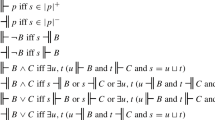Abstract
In a previous paper (see ‘Tolerant, Classical, Strict’, henceforth TCS) we investigated a semantic framework to deal with the idea that vague predicates are tolerant, namely that small changes do not affect the applicability of a vague predicate even if large changes do. Our approach there rests on two main ideas. First, given a classical extension of a predicate, we can define a strict and a tolerant extension depending on an indifference relation associated to that predicate. Second, we can use these notions of satisfaction to define mixed consequence relations that capture non-transitive tolerant reasoning. Although we gave some empirical motivation for the use of strict and tolerant extensions, making use of them commits us to the view that sentences of the form ‘\({p {\vee} {\neg} p}\)’ and ‘\({p {\wedge} {\neg} p}\)’ are not automatically valid or unsatisfiable, respectively. Some philosophers might take this commitment as a negative outcome of our previous proposal. We think, however, that the general ideas underlying our previous approach to vagueness can be implemented in a variety of ways. This paper explores the possibility of defining mixed notions of consequence in the more classical super/sub-valuationist setting and examines to what extent any of these notions captures non-transitive tolerant reasoning.
Similar content being viewed by others
References
Alxatib, S., and J. Pelletier, The psychology of vagueness: Borderline cases and contradictions, Mind and Language, (Forthcoming).
Arruda, A., Aspects of the historical development of paraconsistent logic, in Priest, Routley and Norman (eds.), Paraconsistent logic: essays on the inconsistent, Munchen: Philosophia, 1989.
Bennett, B., Modal semantics for knowledge bases dealing with vague concepts, in A. G. Cohn, L. Schubert and S. Shapiro (eds.), Principles of Knowledge Representation and Reasoning: Proceedings of the 6th International Conference (KR-98), Morgan Kaufman, 1998.
Béziau, J.-Y., Transitivity and paradoxes, in J. Skilters (ed.), The Baltic International Yearbook of Cognition, Logic and Communication, University of Riga, 2006, pp. 207–211.
Cobreros P., Egré P., Ripley D., van Rooij R.: Tolerant, classical, strict. Journal of Philosophical Logic 41, 347–385 (2012)
Dalrymple M., Kanazawa M., Kim Y., Mchombo S., Peters S.: Reciprocal expressions and the concept of reciprocity. Linguistics and Philosophy 21, 159–210 (1998)
Dietz, R., Vagueness and indeterminacy, in L. Horsten and R. Pettigrew (eds.), The Continuum Companion to Philosophical Logic, Oxford University Press, 2011.
Fine K.: Vagueness, truth and logic. Synthese 30, 265–300 (1975)
Hyde D.: From heaps and gaps to heaps of gluts. Mind 106(424), 641–660 (1997)
Hyde D.: Vagueness, Logic and Ontology. Aldershot, Ashgate (2008)
Kamp, H., Two theories about adjectives, in E. L. Keenan (ed.), Formal semantics of natural language, Cambridge University Press, 1975, pp. 123–155.
Kamp H., Partee B.: Prototype theory and compositionality. Cognition 57, 129–191 (1995)
Keefe, R., Theories of Vagueness, Cambridge University Press, 2000.
Kremer P., Kremer M.: Some supervaluation-based consequence relations. Journal of Philosophical Logic 32, 225–244 (2003)
Nait-Abdallah, A., The logic of partial information, Springer, 1995.
Priest, G., An Introduction to Non-Classical Logic: From If to Is, Cambridge University Press, 2008.
Ripley, D., Contradictions at the borders, in R. Nouwen, R. van Rooij, U. Sauerland, and H.-Ch. Smith (eds.), Vagueness in Communication, Springer, 2011, pp. 169–188.
Ripley, D., Sorting out the sorites, in F. Berto, E. Mares, and K. Tanaka (eds.), Paraconsistency: Logic and Applications, Springer, (Forthcoming).
Rooij, R. van, Vagueness, tolerance and non-transitive entailment, in P. Cintula, C. Fermüller, L. Godo, and P. Hajek (eds.), Reasoning Under Vagueness: Logical, Philosophical and Linguistic Perspectives, College Publications, 2011.
Serchuk, P., I. Hargreaves, and R. Zach, Vagueness, logic and use: Four experimental studies on vagueness, Mind and Language, (Forthcoming).
Zardini E.: A model of tolerance. Studia Logica 90, 337–368 (2008)
Author information
Authors and Affiliations
Corresponding author
Rights and permissions
About this article
Cite this article
Cobreros, P., Egré, P., Ripley, D. et al. Tolerance and Mixed Consequence in the S’valuationist Setting. Stud Logica 100, 855–877 (2012). https://doi.org/10.1007/s11225-012-9422-y
Published:
Issue Date:
DOI: https://doi.org/10.1007/s11225-012-9422-y



